Kingsburg
Kingsburg (Originalregel)
Starting the Game
With /join 2-5 players can join the game. With /start the game begins. alternative, you can use the Game Tool!
Object of the Game
Kingsburg is a tactical dice game. Each player tries to expand the province that has been pleasant by the king and protect against invading enemies. To achieve this you must win the support of the King's advisors.
The original detailed rules are available in German in pdf from the publisher's website.
Game board
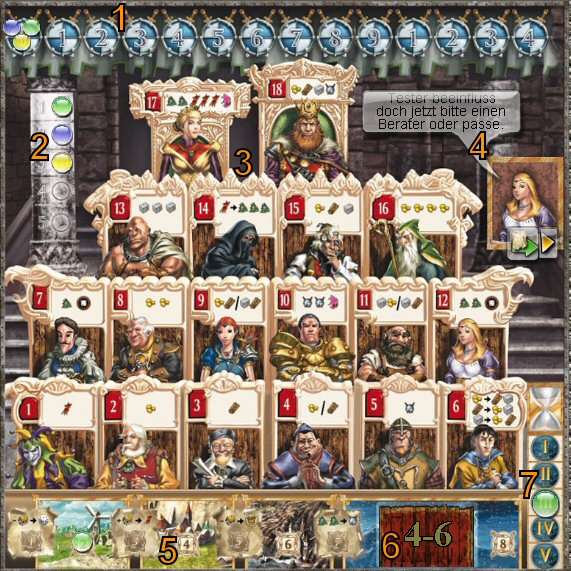
- Military Track
- Gameturn order
- Advisors
- Status Indicator
- Seasons Track
- Combat strength
- Year indicator
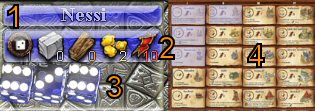
- Player's name (* means start/active player)
- Resources (+2 token/Stone/Wood/Gold/VPs)
- Dice Roll (Advisor influence)
- Building Overview (Build List)
Flow of the game
The game plays over five years. Each year is divided into eight stages. There is an event associated with each season.
Phase 1:King's Aid
The player with the fewest buildings is assisted by the King in the form of an additional the during the spring phase .
If several players have the same number of buildings, the player with the least resources get the bonus. If they are still equal, all these players receive a choice resource, Not applicable a bonus.
Phase 2 : Spring (Production Phase)
Each production phase is divided into four stages:
Roll the dice and adjust the order of turn
After throwing dice, the order for the round is determined. The player with the next point total becomes the first player all others follow according to their total. The addition of the light brown king's favour is included in the assessment of the total. In the case of a tie, the sequence is determined from the previous round.
Influence on Advisor
The newly determined first player may now be first to influence an adviser. They must click on one or more of their dice. The sum of the values of the dice must match the value of desired advisor.
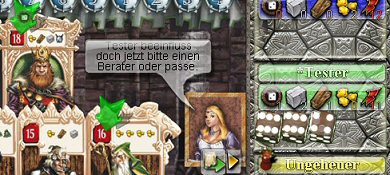
Do this by clicking on the desired dice, (which changes colour to show selection). Once done, one or more green arrows indicate possible advisers to select. To choose an advcisor, simply click on its number .
Here the player has all selected his dice (6-6-4). They can therefore influence the magician (16) or with the help of a +2 token, influence the King (18). They could have influence the General (10) by choice only 6 and 4. then with their next turn, they could choose the alchemist (6) with his other 6.
Taking turns each play chooses an adviser. Each adviser may be influenced only once (Exception: Envoy -> see phase 5)!

Whoever does not want to or can not influence, must click on the 'Pass' arrow. Anyone who passes during this phase is for this phase.
There are four factors involved during the influence stage:
- Envoy: If you have the Envoy at your disposal, you may influence a previously selected advisor. (see stage 5).
- The King's the (Light brown): The additional the given from Phase 1 can be used normally, however, it has to be selected with one or more of the other dice
- +2 Token: This token is provided by the Inn (see Building List) or Advisor #7 (Astronomer) and Advisor #12 (Dutchess) (see Advisor List). You can add 2 points to the value of your die/dice to reach a different advisor. You can only use one token each season to modify your total. You cannot use the token with only the light brown die from the king.
- By having a Market (see Buildings List) you can increase or decrease the value of a die or a group of dice by exactly one.
Help from the Advisors
Once all players have played all their dice or their passed, the Advisors pay out. Starting with the Jester (#1), each adviser provides a service in return for players choosing them.
Some payouts are automatic, while others require the player to choose a resource:

When you hovver the mouse over the resource selection, small green arrows are shown above and below. Using these arrows you can scroll through the available resources. When you select the desired combination, confirm it by clicking on the yellow arrow to the right.
Build buildings
Once all the bonuses have been paid by each advisor, each player may in turn build or pass. (Exception: envoy -> see phase 5). You MUST have the resources needed to build. A transparent disc icon over a building on your building map means that it is currently possible to construct that building. Your current raw materials are shown at the bottom left of your build list.
When building you must build from the left most building in each row. (Example: The first possible buildings are the Statue, Inn, Watchtower, Palisade and Barricade). Future buildings can only be built to the immediate right of already constructed buildings.

e.g. a church (church) can be built only if a statue and a chapel have already been built before.
The functions of a building are now available to the player. You can see the construction costs, victory point bonus and benefits of a building by hovering your mouse over it.
Phase 3 : The King's Reward
The player with the most buildings Service 1 Victory Point . In case of a tie, each player concerned is awarded 1 Victory Point.
Phase 4: Summer (Second Productive Season)
Summer is dissolved in exactly the same way as Phase 2: Spring
Phase 5: The Kings Envoy
King helps the player with the fewest buildings with his Envoy (red pawn). In the case of a tie, the one who receives the envoy is the one with the least resources. If there is again a tie, the envoy is not allocated for this round.
The Envoy can be used in all three phases following the production phase and has the following: advantages
- It can be used to influence an Advisor who has already been influenced.
or
- It can be used to build twice during the construction phase.
If the envoy is not used before Phase 5 of the next round, the marker goes back to the supply and may be assigned again.
Phase 6: Autumn Ö Third Productive Season
Autumn is resolved in exactly the same way as Phase 2: Spring
Phase 7: Recruit Soldiers
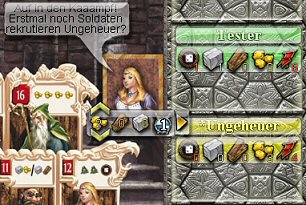
In this phase, all players can recruit one or more soldiers for defense. Each soldier costs any two resources . As with the Advisors, you can set the type and number of resources you wish to pay by using the up/down chevrons. The number of soldiers you will receive is shown to the right. Confirm by clicking on the yellow arrow on the right.
Phase 8: Winter (The Battle)
Winter, unlike other seasons, is not production a phase. That's when the enemies attack. There are different types of enemies (Gobelins, Demons, Zombies, ...) with various fighting force. During the game, the fighting force of the enemies increases. The exact distribution and the list of all the enemies can be found in the Enemies List.

The fighting force expected is shown next to the display for the seasons. In this example, the fighting force will be between 4 and 6.
If a player has previously influenced a counselor, who can spy on enemies General (#10) or Queen (#17), he will see the exact enemy he is facing at this location. By hovering the mouse over it you can see what the spoils of victory or losses in defeat will be.
Your fighting strength is composed of soldiers (see Soldier Track) and defensive forces of the buildings. The king so sends troops. This is done via the roll of a die. The value of this is added to your current fighting strength.
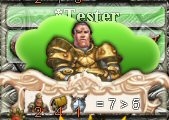
The symbols to the bottom left of the King shows the king's support, your building support and the number of soldiers procured. In this example the player has a combat strength of 7, the enemy has only 5, therefore the player wins the battle.
- If a player has the same fighting strength as the enemy, there is neither victory nor defeat.
- If a player has a fighting strength better than the enemy, he wins the battle and receives a reward.
- If a player has a fighting strength worse than the enemy, he loses the battle and must pay a price.
Spoils of war and payments for defeat dependent on the opponent and may be in the form of victory points, resources or destruction of buildings.
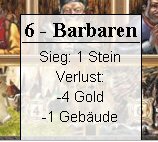
In this example, each player who has won the battle receives a stone. Each player who has lost the fight must give 4 Gold and demolish a building.
When you must demolish a building, the following rules apply:
- You must demolish the further most right building first.
- When there are several buildings which are several buildings are 'most right', you must destroy the building in the highest row.
- Any Victory Points gained for the building are deducted immediately.
- The building can be reconstructed later in the game.
In the case of losing resources, only if the resource is available to be removed are they taken.
The player with the highest fighting strength receives a reward of one Victory Point. But only if they won the battle. Then all the soldiers return home, meaning that the Soldier Track is reset to zero.
The year ends after the battle. The year marker advances years and the round begins again at Phase 1.
End of the Game
The game ends after the battle of the fifth year. The winner is the player who has accumulated the most points of victory. In case of a tie, the number of remaining resources is taken into account. If still tied, the winner is the one who has the most buildings. If still tied, there are several winners.
Rules for Two People
In a two player game, different rules apply during the phases of production (spring, summer, autumn). Three dice are rolled and placed at the advisor for that total. Two dice are rolled and placed at the advisor for that total. If the sum of two dice is identical to the first roll, the two dice are split between two advisors. If the two dice are identical, only one advisor is blocked.
Game Options
dm
Special rules are applied to the 2009 German Team Championship in BSW:
In winter (during battle) troops in support of the king are not determined by the dice, however, each player gets a detachment of soldiers from the king before battling the enemy. The king has available for each player, six sets with 0, 1, 1, 2, 3 and 4 soldiers. Each winter each player determines which detachment of troops to send for this winter.
At the end of the game there will therefore be one unused detachment of soldiers left. The number of soldiers in this detachment will be added as Victory Points at the end.

